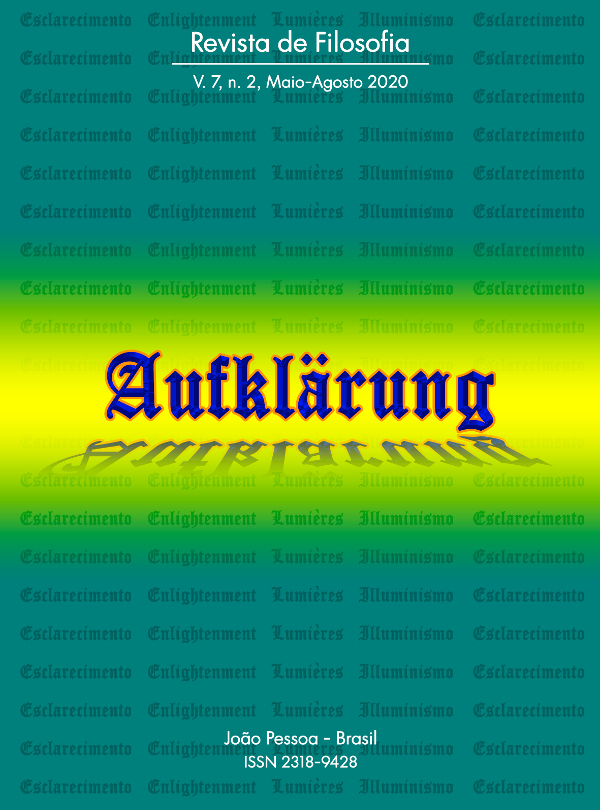Algumas notas sobre o conceito de constituição de R. Carnap no Aufbau e o conceito de constituição de Husserl
DOI:
https://doi.org/10.18012/arf.v7i2.51822Keywords:
Rudolf Carnap, Edmund Husserl, Aufbau, ConstituiçãoAbstract
Este artigo volta-se para o conceito de constituição e algumas noções a esta mais imediatamente relacionadas, contidos no Aufbau de R. Carnap e em trabalhos de Husserl, que podem ter tido alguma influência ali, a fim de encontrar semelhanças e diferenças entre elas. Esperamos isto que contribua para essa avaliação da hipótese plausível, recentemente levantada na literatura, de uma influência do pai da fenomenologia não suficientemente explicitamente creditada em Aufbau. A estratégia argumentativa foi expor, primeiramente de maneira separada, os pontos relevantes a cada vertente e depois fazer o exame comparativo. Essa primeira análise ocorreu sob dois aspectos gerais, a saber, abordar, por um lado, a própria noção de constituição e o que é um sistema seu e, dado o fundacionalismo implicado atribuído a essa noção, os dados que estão na base de um sistema como este. Depois, passamos a examinar as diferenças e semelhanças entre tais exposições. Como resultado, foram observadas semelhanças no sentido que as duas implicam uma tese mais ampla do fundacionalismo; eles propõem, nisto, um sistema abrangente. Além disso, eles afirmam que o fato de haver uma diferença entre um objeto de nível inferior e um objeto de nível superior não implica entre eles a composição mereológica ou alguma comunalidade necessária de propriedades. No entanto, também existem diferenças quanto ao tipo de relacionamento que as noções de constituição implicam em cada caso. Também foram encontradas distinções sobre o papel das sensações em cada sistema; mas, nesse sentido, há, em ambas as perspectivas, também semelhanças quanto ao seu estatuto. O artigo conclui-se com a noção de que deve haver influências husserlianas no Aufbau que não sejam suficientemente creditadas. No entanto, não é razoável o diagnóstico de extrema importância da influência de Husserl.
Downloads
References
BARBER, M. Holism and horizon: Husserl and McDowell on non-conceptual content. Husserl Studies, 24(1): 79–97, 2008.
CARNAP, R. The logical structure of the world. Berkeley: University of California Press, 1967
CARNAP, R. The Unity of Science. Bristol: Thoemmes Press, 1995.
COBB-STEVENS, R. Husserl and analytic philosophy. Dordrecht: Kluwer Academic Publishers, 1990.
DRUMMOND, J. Husserlian Intentionality and Non-foundational Realism: Noema and Object. Dordrecht: Springer, 1990.
DRUMMOND, J. Historical Dictionary of Husserl's Philosophy. Lanham: Scarecrow Press, 2007.
DUTRA, L. Oposições Filosóficas: A Epistemologia e suas Polêmicas. Florianópolis: Editora da UFSC, 2005
DUTRA, L. Pragmática da Investigação Científica. São Paulo: Loyola, 2008
FRIEDMAN, M. Carnap’s Aufbau Reconsidered. Noûs 21(4): 521–45, 1987
FRIEDMAN, M. Reconsidering logical positivism. Cambridge: Cambridge University Press, 1999.
HADDOCK, G. The Young Carnap’s Unknown Master. Farnham: Ashgate Publishing, 2008.
HUSSERL, E Ideen zu einer reinen Phänomenologie und einer phänomenologischen Philosophie II. Den Haag: M. Nijhoff, 1952.
HUSSERL, E. Ideas pertaining to a pure phenomenology and to a phenomenological philosophy. The Hague: Martinus Nijhoff, 1982
HUSSERL, E. Thing and space. Lectures of 1907 (R. Rojcewicz, Trans.). Dordrecht: Kluwer Academic Publishers, 1997.
HUSSERL, E. Logical Investigations – Volume 1. Routledge, 2001a.
HUSSERL, E. Logical Investigations – Volume 2. Routledge, 2001b.
KRAFT, V._El Círculo de Viena. Madrid: Taurus Ediciones, 1986._
Leitgeb, H. New life for Carnap’s Aufbau? Synthese 180 (2):265–299, 2011.
LOCKE, J. An essay concerning human understanding. Oxford: Clarendon Press, 1975.
MOONEY, T. Understanding and simple seeing in Husserl. Husserl Studies 26 (1):19-48, 2010.
MAYER, Y. Die Konstruktion der Erfahrungswelt: Carnap and Husserl Erkenntnis 35 (1): 287-303, 1991
MAYER, Y. Carnap und Husserl. In: BELL, D and VOSSENKUHL, W (Eds). Wissenschaft und Subjektivität, 1992
MORMANN, T. Rudolf Carnap. Munich: C.H. Beck, 2000.
MOULINES, U. Las Raíces Epistemológicas del Aufbau de Carnap, Dianoia 1982 (reprint in Ramón Cirera, Andoni Ibarra and Thomas Mormann (eds), El Programa de Carnap), pp. 45–74.
PINCOCK, C. Carnap's logical structure of the world. Philosophy Compass 4 (6):951-961, 2009.
ROY, J-M, Carnap’s Husserlian Reading of the Aufbau. AWODEY, S; KLEIN, C. (Eds.). Carnap Brought Home: The View from Jena. Chicago: Carus Publishing Company, 2008.
RICHARDSON, A. W. Carnap’s Construction of the World: the Aufbau and the Emergence of Logical Empiricism. Cambridge: Cambridge University Press, 1998.
RUSSELL, B. The Relation of Sense-Data to Physics. In: Mysticism and Logic and Other Essays. Londres: George Allen & Unwin, 1959.
SARKAR, S. Husserl's role in Carnap's der raum. In: Bonk, T (Ed.). Language, Truth and Knowledge. Dordrecht: Kluwer Academic Publishers, 2003.
SCHUHMANN, K. Husserl-Chronik. Den Haag, 1977.
SPIEGELBERG, H. The Context of the Phenomenological Movement. The Hague: Martinus Nijhoff:, 1981.
TAHKO, T., Fundamentality. The Stanford Encyclopedia of Philosophy (Fall 2018 Edition), Edward N. Zalta (ed.), 2018. Disponível em https://plato.stanford.edu/archives/fall2018/entries/fundamentality/.
WILLIFORD, K. Husserl’s hyletic data and phenomenal consciousness. Phenomenology and the Cognitive Sciences. 12 (3):501-519, 2013.
ZAHAVI, D. Constitution and ontology: Some remarks on Husserl's ontological position in the Logical Investigations. Husserl Studies 9 (1):111-124, 1992.
Additional Files
Published
How to Cite
Issue
Section
License
Journal general policy
1.This journal works under a Creative Commons License aplied to online journals. That icence can be read in the following link: Creative Commons Attribution 4.0 International (CC BY 4.0).
2.Accordingly to this License, a)the journal declares that authors hold the copyright of their articles without restrictions, and they can archieve them as post-print elsewhere. b)the journal allow the author(s) to retain publishing rights without restrictions.
Metadata Policy for information describing items in the repository
1. Anyone may access the metadata free of charge at anytime.
2.The metadata may be re-used in any medium without prior permission, even commercial purposes provided the OAI Identifier or a link to the original metadata record are given, under the terms of a CC BY license refered for the Journal.







































